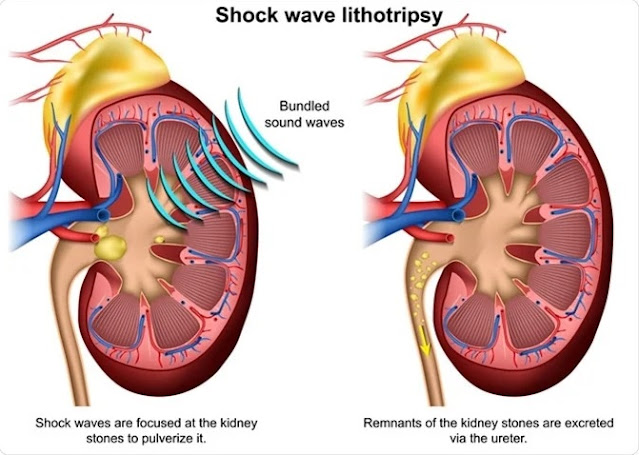The biggest kidney stone on
record weighed more than a kilogram and was 17 centimeters in diameter. The
patient didn't actually swallow a stone the size of a coconut. Kidney stones
form inside the body, but unfortunately, they're extremely painful to get out.
Stones Formation in Kidneys-
A kidney stone is a hard mass of
crystals that can form in the kidneys, ureters, bladder, or urethra. Urine
contains compounds that consist of calcium, sodium, potassium, oxalate, uric
acid, and phosphate. If the levels of these particles get too high, or if
urine becomes too acidic or basic, the particles can clump together and
crystallize. Unless the problem is addressed, the crystals will gradually grow
over a few weeks, months, or even years, forming a detectable stone.
Calcium oxalate is the most common type of crystal
to form this way, and accounts for about 80% of kidney stones. Less
common kidney stones are made of calcium phosphate, or uric
acid. A slightly different type of stone made of the minerals magnesium
ammonium phosphate, or struvite, can be caused by bacterial infection.
And even rarer stones can result from
genetic disorders or certain medications. A kidney stone can go
undetected until it starts to move. When a stone travels through the kidney and
into the ureter, its sharp edges scratch the walls of the urinary tract. Nerve
endings embedded in this tissue transmit excruciating pain signals through the
nervous system. And the scratches can send blood flowing into the urine. This
can be accompanied by symptoms of nausea, vomiting, and a burning sensation
while urinating. If a stone gets big enough to actually block the flow of
urine, it can create an infection, or back flow, and damage the kidneys
themselves. But most kidney stones don't become this serious, or even require
invasive treatment.
Treatment of kidney stones:-
Masses less than five millimeters in
diameter will usually pass out of the body on their own. A doctor will often
simply recommend drinking large amounts of water to help speed the process
along, and maybe taking some pain killers. If the stone is slightly larger,
medications like alpha blockers can help by relaxing the muscles in the
ureter and making it easier for the stone to get through. Another medication
called potassium citrate can help dissolve the stones by creating a less
acidic urine. For medium-sized stones up to about ten millimeters, one option
is pulverizing them with soundwaves.
Extracorporeal shock wave lithotripsy uses high-intensity pulses of
focused ultrasonic energy aimed directly at the stone. The pulses create
vibrations inside the stone itself and small bubbles jostle it. These combined
forces crush the stone into smaller pieces that can pass out of the body more
easily. But zapping a stone with sound doesn't work as well if it's simply too
big.
So sometimes, more invasive
treatments are necessary. A rigid tube called a stent can be placed in
the ureter to expand it. Optical fibers can deliver laser pulses to
break up the stone. Stones can also be surgically removed through an incision in
the patient's back or groin.
What about just avoiding kidney stones in the first place?
For people prone to them, their
doctor may recommend drinking plenty of water, which dilutes the calcium
oxalate and other compounds that eventually build up into painful stones. Foods
like potato chips, spinach, rhubarb, and beets are high in oxalate, so doctors
might advise limiting them. Even though calcium is often found in stones, calcium
in foods and beverages can actually help by binding to oxalate in the digestive
tract before it can be absorbed and reach the kidneys. If you do end up with a
kidney stone, you're not alone. Data suggests that rates are rising, but that
world record probably won't be broken any time soon.
Also read: Why some people get Bald?
Also read: Benefits of crying
Also read: Why do we forget things?
Also read: Soap vs Hand Sanitizer


Comments
Post a Comment
Do comments, on which topic do you want the next blog from us i.e. CBSESolver